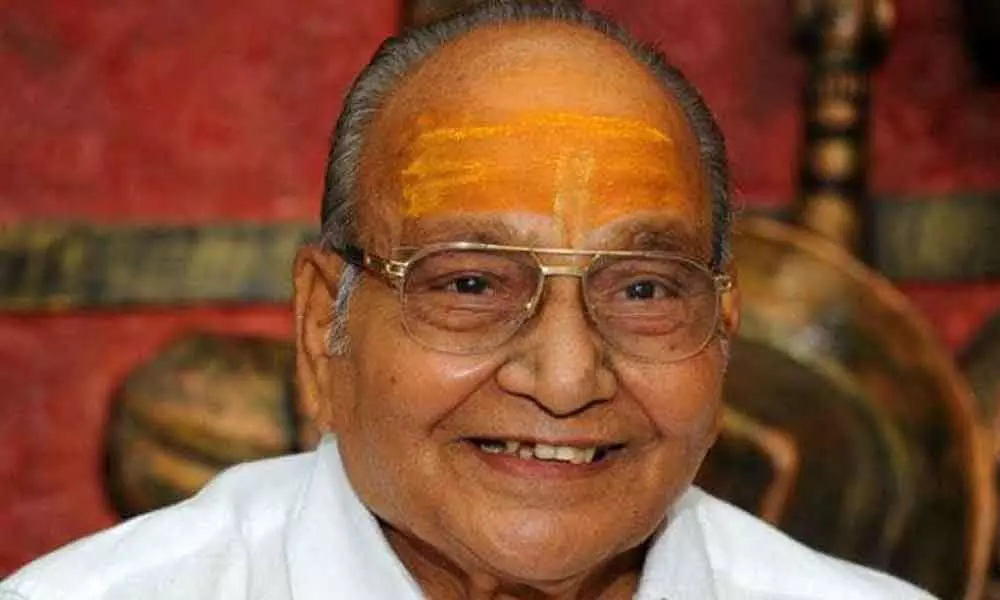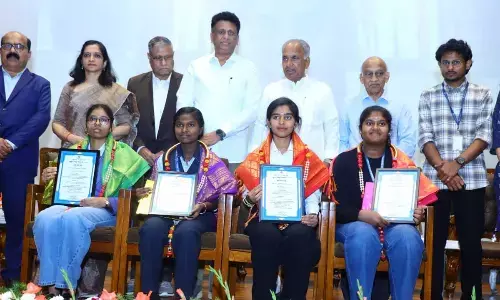K Viswanath brought respect to Telugu cinema

In the era when Telugu films, released in the late1970s and 1980s, were characterized by outlandish costumes and glaring colour, meaningless violence and absence of good plots, K Viswanath’s films stood out by their sensitivity and concerns.
In the era when Telugu films, released in the late1970s and 1980s, were characterized by outlandish costumes and glaring colour, meaningless violence and absence of good plots, K Viswanath's films stood out by their sensitivity and concerns.
Viswanath's films successfully negotiated the chasm between offbeat/parallel cinema and popular films straddling in-between area that appealed to allsections of audience.
Viswanath always claimed that movies are visual by nature and visual art has to be aesthetic. As he said, aesthetic element prevailed in all his films, lending finesse to every frame and endeared him to the classes and masses alike.
Kasinadhuni Viswanath, or K Viswanath, as he is better known, the Dadasaheb Phalke awardee for 2017, has had a film career spanning six decades.Beginning his career as an audiographer at Vauhini Studios in Madras (Chennai), Viswanath moved on to direct films in Telugu, Tamil, and Hindi.
A recipient of five national Film Awards, six Nandi awards, many Filmfare awards, the Padma Shri, and Prize of the Public at the Besancon Film Festival of France for his National-Award winning Telugu film, 'Sankarabharanam' (1980), Viswanath has directed over fifty films.
His first film as director was the Telugu film, AatmaGowravam (1966),which won the Nandi Award for Best Feature Film. This was followed by films like 'ChelleliKapuram,' 'Sharada,' 'O Seetha Katha' and 'Jeevan Jyoti' – social dramas with women protagonists.
In addition, he directed 'Siri SiriMuvva,' that was later remade in Hindi as 'Sargam.' The film about a young girl who could not speak, dreaming to make it as a dancer and succeeding despite all odds,was a great success with melodious songs in both the Telugu and Hindi versions.
His made cult classic 'Sankarabharanam'starring debutant J V Somayajulu. Boasting of wonderful music, it dwells on the changing fortunes of a Carnatic classical music practitioner at a time when the influence of popular music has begun to hold sway on the imagination of the younger generation.
In fact, KViswanath began to use classicalmusic and dance as the subject in his other movies like 'Saagara Sangamam' inwhich Kamal Haasan essayed the self-piteous role of a Kuchipudi dancer, while 'Sruthi Layalu,' 'Swarna Kamalam' were based on music and 'Swayamkrushi' upheld the dignity of labour.
Viswanath's films presented characters who were simple, who struggled to lead a principled, disciplined life. The films addressed issues of caste, socio-economic differences, prejudices, the challenges of the differently-abled, of the weaker sections, the marginalized and women, using an idiom that was popular and appealed to all sections of Telugu audience.
His other film 'Swati Mutyam' presents the life and times of an autistic person with Kamal Haasan essaying the role and it also brought in the subject of widow remarriageand was India's official entry to the 59th Academy Awards in the Best Foreign Film category.
Moving a step ahead, in 'Sirivennela' the protagonists inhabit a world where there is no sound, they cannot hear or speak, a world where music creates wonders.
'Subhalekha' showcases the evils of dowry in a humorous way, while 'Sutradharulu' voices the need to abhor and do away with violence. Though these films have a social message that the director wants to convey, they are presented in such a way that they do not seem to be outright didactic and moralizing.
Viswanath directed Hindi films,too. His Hindi directorial ventures were remakesof his Telugu box office successes like 'Sargam,' 'Kaamchor' 'ShubhKaamna' and 'JaagUthaInsaan' and others to carve a niche for himself in B-town.
In 1995, Viswanath began his acting career in the Telugu film, 'Subha Sankalpam and has since acted as in many Telugu films, notable among them being 'Narasimha Naidu,' 'Santosham', 'Lakshmi Narasimha' and 'Swarabhishekam'.









